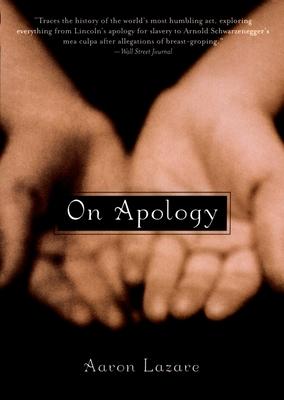Offers a critical dissection of the apology and its implications, looking not only at individuals, but at groups and nations, revealing the feelings and actions of this interaction and illuminating a hidden corner of the human heart.
PW Reviews:
This jewel of a book reveals the many facets of the simple act of apology. Given, there are significant cultural differences in the way humans apologize. "Japanese apologies are more apt to communicate submissiveness, humility, and meekness whereas Americans are more apt to communicate sincerity," writes Lazare, a professor of psychiatry at the University of Massachusetts Medical School.
Under the surface of their differing presentations, however, in spite of their length or even sometimes their complete wordlessness, all true apologies are a kind of offering intended to restore the dignity and self-respect of the offended party, according to the author. An apology can work a miracle, inspiring spontaneous generosity and forgiveness on the part of the offended, whether it is a whole people or a single individual. Drawing on a vast array of literary and real-life examples, such as Agamemnon, George Patton and Arnold Schwarzenegger, from the current pope to the machinist who approached him after a lecture, Lazare lucidly dissects the process of apology: offering an explanation; communicating remorse, shame, humility or sincerity (according to our cultural values); making a gesture of reparation or reconciliation. Among the most moving examples in the book is Lincoln's second inaugural address, in which he apologizes for American slavery : "two hundred and fifty years of unrequited toil" enabling some to "wring their bread from the sweat of other men's faces." Just as breathtaking was the apology made by Kevin Gover, an assistant secretary of Indian affairs, for that agency's grave crimes against the Indian people. Lazare succeeds in showing that a true apology is among the most graceful and profound of all human exchanges. When it is sincere, it is not an end but a new beginning. "It is a behavior that requires of both parties an attitude of honesty, generosity, humility, commitment, and courage," he writes.
Everybody on earth could benefit from this small but essential book.
Choice Reviews:
Does it matter whether one apologizes or how one begs forgiveness? Yes, indeed, mea culpas matter, according to Lazare (Univ. of Massachusetts Medical School, Worcester), who writes compellingly, at times movingly, about the many facets of apologies. He gives theoretical and practical weight to what many readers will know from struggles with fellow humans: there are right and wrong ways of delivering an apology, and recipients and observers can readily discern the sincere from the perfunctory or prideful. Lazare collects apology tales to illustrate how and when (if ever) everyday people and the famous elect to offer regrets for their transgressions. He culls many of these anecdotes from history and the media and draws others from his own experience, about which he is always candid. These stories demonstrate the absolute necessity of restoring harmony and social order by accepting responsibility by earnestly, directly, and often quickly offering apologies for misdeeds. This volume is really for all readers, although psychologists and sociologists will be especially intrigued. The book will be valuable supplemental reading in coursework intersecting with issues of social life and the emotions. Summing Up: Essential. All collections; all levels.












